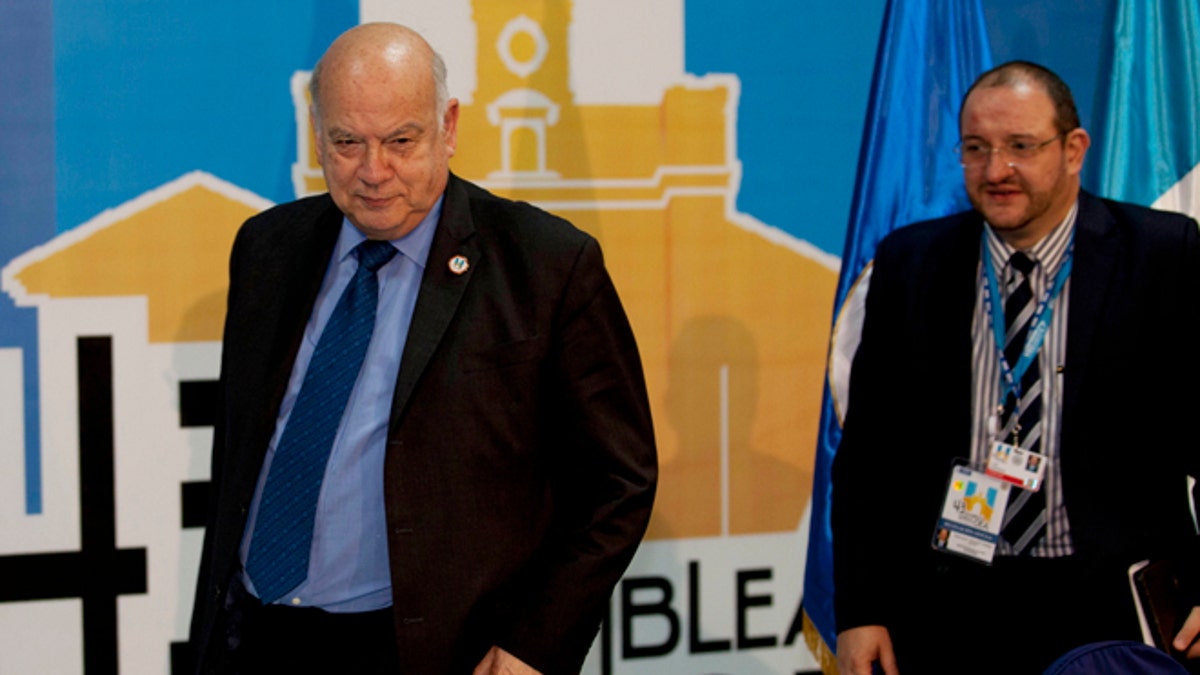
Organization of American States Secretary General Jose Miguel Insulza, left, and Guatemala's Foreign Minister Fernando Carrera arrive for a press conference in Antigua Guatemala, Guatemala, Monday, June 3, 2013.
ANTIGUA, Guatemala – As the number of dead rises into the tens of thousands in a region beset by drug cartels, Latin American countries frustrated by the United States' refusal to change its drug war strategy will push at a conference beginning Tuesday for the U.S. government to start discussing alternative approaches.
Guatemalan Foreign Relations Secretary Fernando Carrera said the subject of drugs will top the agenda at the Organization of American States' General Assembly, which opens a three-day session in Antigua.
"We have already reached a consensus and agreed that our final declaration will include changes to the current anti-drug model," Carrera said. "We already have some ideas on how to change drug-fighting policies."
U.S. Secretary of State John Kerry and Assistant Secretary for the Bureau of International Narcotics and Law Enforcement Affairs William R. Brownfield are scheduled to attend the meeting, which comes two weeks after the OAS released a report calling for a serious discussion on legalizing marijuana.
But the study doesn't make specific proposals and found there is "no significant support" among the OAS's 35 member states for legalizing cocaine, the illegal drug with the greatest impact on Latin America, or other harsher drugs.
- ‘We Are Big Marijuana,’ Company Gets Support From Former Mexican President
- Kids At Increased Risk To Be Poisoned By Medical Marijuana, Study Finds
- Colombia Hopes Marijuana Will Help Addicts Kick Hard Drug Habit
- Microsoft Manager Becomes Marijuana Mogul, Plans To Import Drugs From Mexico
- Medical Marijuana Gets Approved By Maryland Lawmakers
- Best Sports Pix Of The Week
- Jobless Mexicana Flight Attendants Pose for Calendar
The study was commissioned after some Latin American leaders called on President Barack Obama to rethink the war on drugs at last year's Summit of the Americas in Cartagena, Colombia.
It urges "assessing existing signals and trends that lean toward the decriminalization or legalization of the production, sale and use of marijuana. Sooner or later decisions in this area will need to be taken."
Among those countries pushing for a dialogue on drugs in the Western Hemisphere are many who have been close allies of the United States' fight against drugs, including Colombia and Guatemala.
Colombian President Juan Manuel Santos was among those urging a discussion of legalization. He said that while his country extradites hundreds of alleged drug traffickers for trial in the U.S., criminals turn to other countries where law enforcement is weaker. Central America and Mexico in particular have been hit hard as traffickers shifted operations there.
President Otto Pérez Molina of Guatemala, a hard-hit cocaine transit country along with neighboring Honduras, made headlines shortly after taking power last year when he proposed legalizing drugs. Mexican President Enrique Peña Nieto has implemented a new policy for cooperating with the U.S. that is a dramatic shift from the direct sharing of resources and intelligence between U.S. and Mexican law enforcement under former President Felipe Calderón.
Neither Santos nor Peña Nieto will be attending the meeting.
"The message has been sent that the hemisphere wants to look at alternative approaches and wants the United States to be part of that discussion," said Cynthia Arnson, director of the Latin American program at the Washington-based Woodrow Wilson International Center for Scholars.
Arnson said Latin American leaders will use the meeting to spur a discussion that can be sustained as countries try to go forward with a new strategy.
"Latin American countries will mostly be looking for ways to diminish the violence and the negative effects on their societies and their economies posed by organized crime and they may increasingly diverge with the United States over what policies to adapt," she said.
Latin America is raising the issue of legalizing marijuana as the same debate takes place in the United States, where voters in several states have approved initiatives to decriminalize possession of marijuana for personal use.
Dozens of human rights organizations from Canada to Argentina signed a letter Monday asking for leaders "to discuss and rethink the existing initiatives with a view to place human rights in the center of the debate."
"This prohibitionist model has broadened social and economic inequalities, as well as deepened political cleavages and international asymmetries," the letter says.
While the OAS meeting promises to serve as a forum to begin discussing the legalization of marijuana, talking about harder drugs like cocaine, heroin and methamphetamines may be harder to bring to the table, Arnson said.
"It's one thing to say, 'Let's break the ice on talking about these issues,' and it's another thing to come forward with concrete proposals for dealing with harder drugs that many countries can sign on to, including the United States," she said.
Based on reporting by The Associated Press.
Follow us on twitter.com/foxnewslatino
Like us at facebook.com/foxnewslatino








































